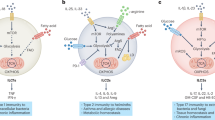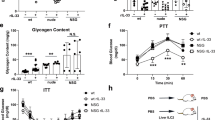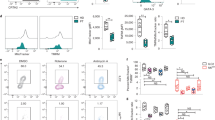Abstract
IL-3 regulates the glycolytic pathway. In Baf-3 cells IL-3 starvation leads to a decrease in glucose uptake and in lactate production. To determine if there is a link between the decreased metabolism induced by growth factor-starvation and the induction of cell death, we have compared the cell death characteristics and the metabolic modifications induced by IL-3-deprivation or glucose-deprivation in Baf-3 cells. We show that in both conditions cells die by an apoptotic process which involves the activation of similar Caspases. Different metabolic parameters (i.e. intracellular ATP levels and lactate accumulation in the culture medium) were measured. We show that IL-3 deprivation leads to a partial decrease in lactate production in contrast to glucose deprivation that completely inhibits lactate production. Similarly following IL-3-starvation a significant drop in the intracellular ATP levels in live cells is observed only after 16 h when a large fraction, more than 50 per cent of cells, is already apoptotic. On the contrary, glucose deprivation is followed by an abrupt decrease in ATP levels in the first 2 h of treatment. However, in the presence of IL-3, cells are able to survive for an extended time in these conditions since 70% of cells survived with low ATP levels for up to 16 h. This was not due to partial inhibition of the apoptotic process by the low level of ATP as glucose-deprivation in the absence of IL-3 led to faster death kinetics of Baf-3 cells compared with IL-3 starvation only. These results indicate that the drop in ATP levels and the triggering of apoptosis can be dissociated in time and that when the glycolytic pathway is strongly inhibited, cells are able to survive with relatively low ATP levels if IL-3 is present. Finally we show that induction of bcl-x by IL-3 protects cells from glucose-deprivation induced cell death.
Similar content being viewed by others
Log in or create a free account to read this content
Gain free access to this article, as well as selected content from this journal and more on nature.com
or
Abbreviations
- IL-3:
-
interleukin-3
- GSK-3:
-
glycogen synthase-3 kinase
- 2-DG:
-
2-deoxy-D-glucose
References
Li N, Batzer A, Daly R, Yajnik V, Skolnik E, Chardin P, Bar-Sagi D, Margolis B, Schlessinger J . 1993 Guanine-nucleotide-releasing factor hSos1 binds to Grb2 and links receptor tyrosine kinases to Ras signalling Nature 363: 85–88
Gold MR, Duronio V, Saxena SP, Schrader JW, Aebersold R . 1994 Multiple cytokines activate phosphatidylinositol 3-kinase in hemopoietic cells. Association of the enzyme with various tyrosine-phosphorylated proteins J. Biol. Chem. 269: 5403–5412
Reddy EP, Korapati A, Chaturvedi P, Rane S . 2000 IL-3 signaling and the role of Src kinases, JAKs and STATs: a covert liaison unveiled Oncogene 19: 2532–2547
de Peso L, Gonzalez-Garcia M, Page C, Herrera R, Nunez G . 1997 Interleukin-3-induced phosphorylation of BAD through the protein kinase Akt Science 278: 687–689
Songyang Z, Baltimore D, Cantley LC, Kaplan DR, Franke TF . 1997 Interleukin 3-dependent survival by the Akt protein kinase Proc. Natl. Acad. Sci. USA 94: 11345–11350
Brunet A, Bonni A, Zigmond MJ, Lin MZ, Juo P, Hu LS, Anderson MJ, Arden KC, Blenis J, Greenberg ME . 1999 Akt promotes cell survival by phosphorylating and inhibiting a Forkhead transcription factor Cell 96: 857–868
Cardone MH, Roy N, Stennicke HR, Salvesen GS, Franke TF, Stanbridge E, Frisch S, Reed JC . 1998 Regulation of cell death protease caspase-9 by phosphorylation Science 282: 1318–1321
Barthel A, Okino ST, Liao J, Nakatani K, Li J, Whitlock JP Jr, Roth RA . 1999 Regulation of GLUT1 gene transcription by the serine/threonine kinase Akt1 J. Biol. Chem. 274: 20281–20286
Kohn AD, Summers SA, Birnbaum MJ, Roth RA . 1996 Expression of a constitutively active Akt Ser/Thr kinase in 3T3-L1 adipocytes stimulates glucose uptake and glucose transporter 4 translocation J. Biol. Chem. 271: 31372–31378
Cross DA, Alessi DR, Cohen P, Andjelkovich M, Hemmings BA . 1995 Inhibition of glycogen synthase kinase-3 by insulin mediated by protein kinase B Nature 378: 785–789
Pap M, Cooper GM . 1998 Role of glycogen synthase kinase-3 in the phosphatidylinositol 3-Kinase/Akt cell survival pathway J. Biol. Chem. 273: 19929–19932
Crowder RJ, Freeman RS . 2000 Glycogen synthase kinase-3 beta activity is critical for neuronal death caused by inhibiting phosphatidylinositol 3-kinase or Akt but not for death caused by nerve growth factor withdrawal J. Biol. Chem. 275: 34266–34271
Gottlob K, Majewski N, Kennedy S, Kandel E, Robey RB, Hay N . 2001 Inhibition of early apoptotic events by Akt/PKB is dependent on the first committed step of glycolysis and mitochondrial hexokinase Genes Dev. 15: 1406–1418
Kan O, Baldwin SA, Whetton AD . 1994 Apoptosis is regulated by the rate of glucose transport in an interleukin 3 dependent cell line J. Exp. Med. 180: 917–923
Dang CV, Semenza GL . 1999 Oncogenic alterations of metabolism Trends Biochem. Sci. 24: 68–72
Rathmell JC, Vander Heiden MG, Harris MH, Frauwirth KA, Thompson CB . 2000 In the absence of extrinsic signals, nutrient utilization by lymphocytes is insufficient to maintain either cell size or viability Mol. Cell 6: 683–692
Vander Heiden MG, Plas DR, Rathmell JC, Fox CJ, Harris MH, Thompson CB . 2001 Growth factors can influence cell growth and survival through effects on glucose metabolism Mol. Cell. Biol. 21: 5899–5912
Palacios R, Garland J . 1984 Distinct mechanisms may account for the growth-promoting activity of interleukin 3 on cells of lymphoid and myeloid origin Proc. Natl. Acad. Sci. USA 81: 1208–1211
Garland JM, Halestrap A . 1997 Energy metabolism during apoptosis. Bcl-2 promotes survival in hematopoietic cells induced to apoptose by growth factor withdrawal by stabilizing a form of metabolic arrest J. Biol. Chem. 272: 4680–4688
Mathieu AL, Gonin S, Leverrier Y, Blanquier B, Thomas J, Dantin C, Martin G, Baverel G, Marvel J . 2001 Activation of the phosphatidylinositol 3-kinase/Akt pathway protects against interleukin-3 starvation but not DNA damage-induced apoptosis J. Biol. Chem. 276: 10935–10942
Leverrier Y, Thomas J, Mathieu AL, Low W, Blanquier B, Marvel J . 1999 Role of PI3-kinase in Bcl-X induction and apoptosis inhibition mediated by IL-3 or IGF-1 in Baf-3 cells Cell Death Differ. 6: 290–296
Leverrier Y, Thomas J, Perkins GR, Mangeney M, Collins MK, Marvel J . 1997 In bone marrow derived Baf-3 cells, inhibition of apoptosis by IL-3 is mediated by two independent pathways Oncogene 14: 425–430
Thomas J, Leverrier Y, Marvel J . 1998 Bcl-X is the major pleiotropic anti-apoptotic gene activated by retroviral insertion mutagenesis in an IL-3 dependent bone marrow derived cell line Oncogene 16: 1399–1408
Khaled AR, Reynolds DA, Young HA, Thompson CB, Muegge K, Durum SK . 2001 Interleukin-3 withdrawal induces an early increase in mitochondrial membrane potential unrelated to the Bcl-2 family. Roles of intracellular pH, ADP transport, and F(0)F(1)-ATPase J. Biol. Chem. 276: 6453–6462
Whetton AD, Bazill GW, Dexter TM . 1984 Haemopoietic cell growth factor mediates cell survival via its action on glucose transport EMBO J. 3: 409–413
Ahmed N, Berridge MV . 1997 Regulation of glucose transport by interleukin-3 in growth factor-dependent and oncogene-transformed bone marrow-derived cell lines Leuk. Res. 21: 609–618
Deprez J, Vertommen D, Alessi DR, Hue L, Rider MH . 1997 Phosphorylation and activation of heart 6-phosphofructo-2-kinase by protein kinase B and other protein kinases of the insulin signaling cascades J. Biol. Chem. 272: 17269–17275
Halicka HD, Ardelt B, Li X, Melamed MM, Darzynkiewicz Z . 1995 2-Deaoxy-D-glucose enhances sensitivity of human histiocytic lymphoma U937 cells to apoptosis induced by tumor necrosis factor Cancer Res. 55: 444–449
Mohanti BK, Rath GK, Anantha N, Kannan V, Das BS, Chandramouli BA, Banerjee AK, Das S, Jena A, Ravichandran R, Sahi UP, Kumar R, Kapoor N, Kalia VK, Dwarakanath BS, Jain V . 1996 Improving cancer radiotherapy with 2-deoxy-D-glucose: phase I/II clinical trials on human cerebral gliomas Int. J. Radiat. Oncol. Biol. Phys. 35: 103–111
Plas DR, Talapatra S, Edinger AL, Rathmell JC, Thompson CB . 2001 Akt and Bcl-xL promote growth factor-independent survival through distinct effects on mitochondrial physiology J. Biol. Chem. 276: 12041–12048
Vander Heiden MG, Chandel NS, Schumacker PT, Thompson CB . 1999 Bcl-xL prevents cell death following growth factor withdrawal by facilitating mitochondrial ATP/ADP exchange Mol. Cell 3: 159–167
Hajduch E, Alessi DR, Hemmings BA, Hundal HS . 1998 Constitutive activation of protein kinase B alpha by membrane targeting promotes glucose and system A amino acid transport, protein synthesis, and inactivation of glycogen synthase kinase 3 in L6 muscle cells Diabetes 47: 1006–1013
Faradji RN, Havari E, Chen Q, Gray J, Tornheim K, Corkey BE, Mulligan RC, Lipes MA . 2001 Glucose-induced toxicity in insulin-producing pituitary cells that coexpress GLUT2 and glucokinase. Implications for metabolic engineering J. Biol. Chem. 276: 36695–36702
Acknowledgements
S Gonin-Giraud and A-L Mathieu are the recipient of fellowships from La Ligue contre le cancer. This work was supported by institutional grants from the I.N.S.E.R.M. and by specific grants from the Association pour la Recherche contre le Cancer and the Ligue Régionale Rhône-Alpes contre le cancer. We thank Christophe Arpin for statistical analysis and Janet Maryanski and C Arpin for critical reading.
Author information
Authors and Affiliations
Corresponding author
Additional information
Edited by R A Knight
Rights and permissions
About this article
Cite this article
Gonin-Giraud, S., Mathieu, AL., Diocou, S. et al. Decreased glycolytic metabolism contributes to but is not the inducer of apoptosis following IL-3-starvation. Cell Death Differ 9, 1147–1157 (2002). https://doi.org/10.1038/sj.cdd.4401079
Received:
Revised:
Accepted:
Issue date:
DOI: https://doi.org/10.1038/sj.cdd.4401079
Keywords
This article is cited by
-
iTRAQ®-based quantitative proteomics reveals the proteomic profiling of methicillin-resistant Staphylococcus aureus-derived extracellular vesicles after exposure to imipenem
Folia Microbiologica (2021)
-
Hexokinase inhibition using D-Mannoheptulose enhances oncolytic newcastle disease virus-mediated killing of breast cancer cells
Cancer Cell International (2020)
-
Newcastle disease virus suppress glycolysis pathway and induce breast cancer cells death
VirusDisease (2020)
-
Sestrin2 integrates Akt and mTOR signaling to protect cells against energetic stress-induced death
Cell Death & Differentiation (2013)
-
Sugar-free approaches to cancer cell killing
Oncogene (2011)



